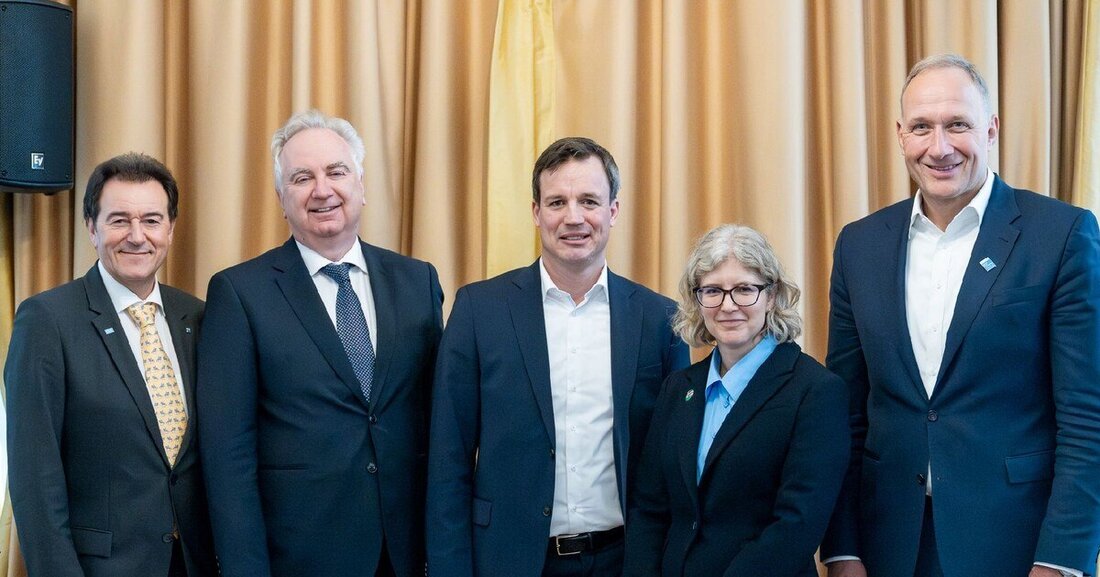Engine experts advocate diversity
The Vienna Motor Symposium also focused on energy issues and their consequences for the development of alternative drives.

Engine experts advocate diversity
Several vehicle manufacturers, energy experts and supplier companies warn that individual technical solutions will not be enough to bring greenhouse gas emissions towards zero by 2050. Michael Fleiss, CEO of the drive developer Aurobay Europe, Rebecca Yates, Vice President at the energy group bp, Arnd Franz, Chairman of the Board and CEO of the global automotive supplier Mahle, Karl Rose, former chief strategist at the Abu Dhabi National Oil Company ADNOC and Bernhard Geringer, Chairman of the Austrian Association for Automotive Technology ÖVK, spoke at the 45th International Vienna Motor Symposium about strategies for achieving net zero emissions Drive models with hydrogen and a sensible mix of new sustainable supply sources.
“The energy transition offers both opportunities and challenges for the future of mobility and fuel systems,” said Karl Rose, former chief strategist at oil company ADNOC (Abu Dhabi National Oil Company) in the United Arab Emirates. "On the one hand, for the first time, the world is on track to reach the peak of all fossil fuels before the end of the decade. On the other hand, I believe that after 2030 some of the regulatory targets for sustainable aviation fuels will prove to be too ambitious and therefore need to be adapted to realizable potential. Given the increasing amount of biofuels required, there will once again be serious social debates on the topics of 'food versus fuel' and 'industrialized countries versus emerging markets'. Regardless of our efforts “We will run out of raw materials in some areas sooner rather than later.” According to Rose, the transition to electrified mobility requires large investments in infrastructure, network capacity and battery manufacturing, which raises questions about supply chains and scalability to meet increasing demand: “It requires rapid responses to the evolving situation and flexible development paths to be able to achieve the long-term goal of net zero emissions.”
The powertrain and vehicle industry has already taken important steps towards sustainability by developing and using alternatives to fossil fuels. Bernhard Geringer, organizer of the International Vienna Motor Symposium, emphasized that the energy question must always be at the forefront of all the innovations, because: "Whoever has the energy will win the race. The biggest challenge will be to cover the increasing sustainable energy demand, be it for the operation of electric vehicles or the production of synthetic fuels, while at the same time minimizing the negative consequences for the environment. The availability of green electricity should be above the entire drive discussion and the promotion of individual solutions."
“bp is developing a range of products and solutions to meet the rapidly increasing energy demand as transportation decarbonizes,” said Rebecca Yates, Vice President Advanced Lubricants Products at global petroleum and energy company bp. "We will continue to develop and scale these to meet the energy needs of future low-carbon mobility. Lubricants also play an important role in ensuring optimal performance across all powertrains and also reflect our commitment to a circular approach. As we continue to scale and adapt, we are leaving no stone unturned to meet the demand for low-carbon solutions in the ever-changing transportation landscape." Michael Fleiss, CEO of Aurobay Europe, a joint venture between Volvo and Geely with a focus on the production of complete powertrains, also called for a global approach to decarbonizing the transport sector: “Electrification is still a viable option, but many manufacturers and experts have recognized that no single solution can be sufficient if we want and need to reduce emissions so drastically by 2040. It is important to work together to ensure that the mobility of tomorrow is accessible to everyone regardless of geographic location, infrastructure or resource availability.”
Arnd Franz, chairman of the board and CEO of the globally active supplier group Mahle, sees the need for a multi-way drive strategy as the most efficient approach for rapid decarbonization of the mobility and transport sector: "Battery-electric vehicles alone will not be enough to achieve the climate goals. We also need sustainable combustion engines that can be operated with renewable fuels. Combustion engines are used especially - but not only - in sparsely populated economies and for many applications in the commercial vehicle sector “In addition to battery-powered electric vehicles, highly efficient engines that can run on e-fuels, hydrogen or other non-fossil fuels will remain the technology of choice for the foreseeable future, helping to reduce the carbon footprint of mobility more quickly.”

 Suche
Suche
 Mein Konto
Mein Konto